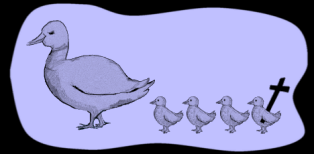“It ain’t what a man don’t know that makes him a fool, but what he does know that ain’t so.” – Josh Billings (Henry Wheeler Shaw)
The workers of San Diego’s Wild Animal Park were facing a strange kind of problem. While promoting the California condor breeding program, they reached a point in time when they were about to see some newly hatched chicks. However, they had to take precautions so that the chicks would not see them. They actually used some puppets to hide their hands, in order to fool the chicks.
Raising animals in captivity introduces a whole new set of problems, some of which are surprising. It appears that many kinds of chicks and cubs tend to imprint whatever they see after they are born and follow it around from then on. They interpret it as their mother, and interestingly, evolution has programmed them to follow their mother and mimic lots of her behaviors.
Humans – so it seems – are also extremely open to imprint things they see around them when they’re young. Families who have migrated from one country to another have often encountered another related syndrome: It appears that their small children have picked up the new language miraculously, to such an extent that they switch spontaneously to speaking it. They sometimes even do it in the presence of their parents, who barely understand the new sounds. They seem to do it especially when they’re excited or upset.
We largely absorb our understanding of the world around us from the way we are brought up. We are built to do so. In spite of what we may think, we have little control over this process. Have you noticed how in an Islamic environment, most people grow to be Muslims, while in a Christian environment, people somehow grow to worship the Trinity? The very same person would argue passionately about totally different things, if they had spent their childhood among others.
From the moment we are formed until we are full grown, our perception of this world changes from almost zero to everything we know, or think we know. Generally speaking, this dramatic change may be contributed to two sources only. One of them is found in our genes and the way we have evolved – for example: No one taught us how to suck milk as infants, or how to hold objects tightly with our little baby hands. The other source of our knowledge is in everything we see, hear, smell, feel and taste – whether this data comes from still objects, plants, animals or other people around us. This is what we grow up with, and is eventually the major source of information for us that turns into the abstract contents of these little boxes in the top of our heads.
And what do we see, hear, smell, feel and taste in this modern world of the 21st century? From the moment we start hearing stories, we learn about God, the Bible, miracles and saviors, monsters and witches, vampires and aliens. From the time we start seeing pictures and signs, we see the artistic comforting face of Jesus Christ, the glaring eyes of the Ayatollah Khomeini, and/or copies of the New Testament in every Western hotel room. It would take a really strong personality to put some solid sense into this stream of confusing emotional input.

The following famous joke illustrates the spirit of things:
A little girl was talking to her teacher about whales.
“Whales can’t swallow people,” the teacher said. “Even though they are large mammals, their throats are very small.”
“But Jonah was swallowed by a whale,” the little girl replied.
“That just can’t be,” the teacher said. “It’s physically impossible.”
“When I get to heaven I will ask Jonah,” said the little girl.
The teacher looked down at her, smiled and asked, “What if Jonah went to hell?”
The little girl replied, “Then you ask him.”
You see, the little girl in the joke is merely you and I. We are programmed to act in certain ways and follow what we are repeatedly told. It is a human characteristic to consider things shown to us when we are young as true. It is another human characteristic to think we control this process and choose our truths. In fact we largely don’t.
<< Prev Contents Next >>






